Vietnam's 40 years of doi moi and a 2045 vision highlighted
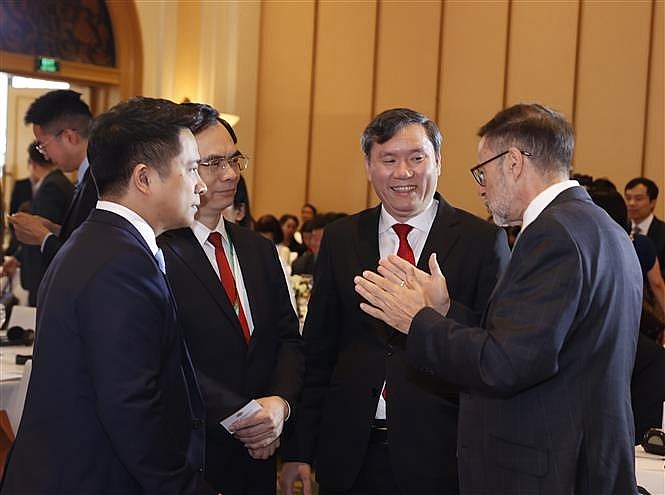 |
| Foreign and local experts discussing at the workshop themed “Vietnam: 40 years of doi moi and 2045 vision”. Photo: VNA |
The Ho Chi Minh National Academy of Politics (HCMA) and the Australian Embassy Vietnam have held a workshop “Vietnam: 40 years of doi moi and 2045 vision,” this week.
More than 200 delegates from party agencies, government ministries, research institutes and academia, and representatives of the Australian Embassy Vietnam and Australian experts attended.
The workshop is an integral part of a strategic research series supported by the Vietnam Australia Centre (VAC) to develop policy analysis and recommendations on key development issues to inform Vietnam’s strategic vision to 2045. This includes inputs to serve the review of 40 years of the economic reforms in the 1980s and the drafting of the 14th National Party Congress documents.
The workshop included presentations on six topics identified as central to Vietnam’s development, including the global megatrends, public governance sector reform, avoiding the middle-income trap, financial sector reform, urbanisation, and sustainable development.
This was followed by a panel discussion with Australian academics from Curtin University, RMIT University, and the University of Adelaide and speakers from the United Nations Development Program, the World Bank, the Asian Development Bank and Oxfam.
Speaking at the workshop, Professor Nguyen Xuan Thang, Politburo member and Ho Chi Minh Academy chairman emphasised the significance of the doi moi research series and the valuable collaboration between Australian and Vietnamese experts. This demonstrates the strong political trust and commitment to knowledge exchange between both countries.
"After nearly 40 years of doi moi, Vietnam has developed well from a centrally planned economy to a market mechanism; proactively and actively integrating comprehensively and deeply; promoting industrialisation and modernisation; approaching outstanding creative work unique of Vietnamese people. The country has achieved great historical significant achievements," Thang said.
From a backward poor agricultural country with a small economic scale and a GDP of only $26.3 billion in the early years of reform, Vietnam has left the group of low-income countries since 2008.
The economy's scale reached $430 billion, ranking 35th in the top 40 largest economies in the world. In 2023, GDP per capita was $4,300, an increase of nearly 58 times compared to the first years of innovation.
From a closed economy, Vietnam has become the 22nd largest trading partner globally. In 2023, the country's total import-export turnover reached nearly $700 billion; foreign investment disbursement reached $23 billion, the highest amount ever, while even large markets have shrunk and numerous global supply chains have been disrupted.
Thang suggested experts share vivid and rich experiences from the world, especially from countries with similar levels, close to Vietnamese practice, to help Vietnam quickly find possible solutions to address difficulties in the process of innovation, integration, and development.
Australian Ambassador to Vietnam Andrew Goledzinowski was impressed with the efforts of nearly 40 Australian and Vietnamese experts who participated in the research.
"We are working to support Vietnam to realise its 2045 vision. Our relationship has never been stronger, and we will continue to build trust and collaborate on the areas of mutual interest as outlined in the Comprehensive Strategic Partnership,” he said.
The VAC, a joint initiative between Australia and Vietnam, is supporting Vietnam to strengthen the skills of Vietnamese leaders further and unite Australia and Vietnam in common regional issues and shared challenges.
Foundational partners include the Ho Chi Minh Academy, the Ministry of Foreign Affairs, the Government Office, and the Party Central Commission for External Relations.
Since 2022, the VAC has engaged over 3,000 senior party and government officials in professional development, research, and knowledge exchange activities.
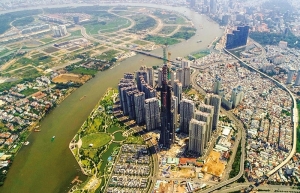 | From Doi Moi reforms to Vietnamese billionaires After more than 30 years of Doi Moi, the Vietnamese economy has begun to see its own local billionaires who while contributing to national development, are in need of a facilitating environment to continue prospering. |
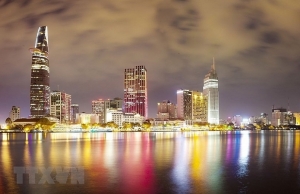 | Southern region thrives after 45 years of reunification After 45 years of national reunification and three decades of the Doi Moi (renewal) process, under the leadership of the Party, southern provinces and cities’ economy have thrived dramatically. |
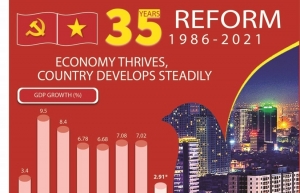 | Vietnam after 35 years of reform (Infographics) 35 years after the 'Doi moi' (reform) process (1986-2021), Vietnam's economy has thrived, helping the country develop steadily. |
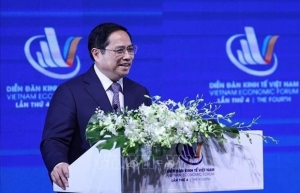 | Vietnam persists with Doi Moi, door-opening and integration policy: PM The 4th Vietnam Economic Forum has affirmed the correct and effective policy of the Party and State on pursuing Doi Moi (renewal), building an independent, self-reliant economy in combination with proactive and active international integration, Prime Minister Pham Minh Chinh said at the forum on June 5. |
What the stars mean:
★ Poor ★ ★ Promising ★★★ Good ★★★★ Very good ★★★★★ Exceptional
Related Contents
Latest News
More News
- VinaCapital launches Vietnam's first two strategic-beta ETFs (February 26, 2026 | 09:00)
- PM sets five key tasks to accelerate sci-tech development (February 26, 2026 | 08:00)
- PM outlines new tasks for healthcare sector (February 25, 2026 | 16:00)
- Citi report finds global trade transformed by tariffs and AI (February 25, 2026 | 10:49)
- Vietnam sets ambitious dairy growth targets (February 24, 2026 | 18:00)
- Vietnam, New Zealand seek level-up in ties (February 19, 2026 | 18:06)
- Untapped potential in relations with Indonesia (February 19, 2026 | 17:56)
- German strengths match Vietnamese aspirations (February 19, 2026 | 17:40)
- Vietnam’s pivotal year for advancing sustainability (February 19, 2026 | 08:44)
- Strengthening the core role of industry and trade (February 19, 2026 | 08:35)

 Tag:
Tag:
























 Mobile Version
Mobile Version